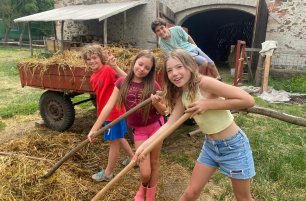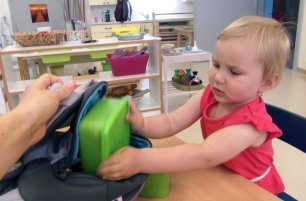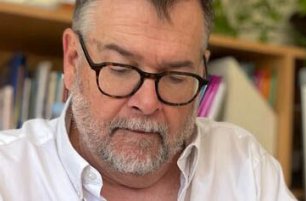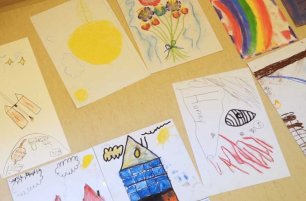A Conversation with Ms. Pherooz Karani
Find out more about our Head of School, Ms. Pherooz Karani. Her greatest joy is to pass on the legacy of Montessori education to new generations of children.
You were a Montessori child almost from birth. What do you think it gave you? How much do you remember?
I truly was a Montessori child from the start and I’m so grateful for it! But to be honest, I don’t remember many of the lessons or specific activities in the classrooms. When I did my three trainings, I was so excited to be reintroduced to all these amazing materials and lessons and they all felt brand new to me. What I do remember is the community feeling, the sense that I was in a place where I could explore and discover and feel safe. As an adult, I realized that one thing had been ingrained in me… normalization through Practical Life work. When stressed or upset, even now, I often turn towards cleaning, organizing or cooking. I truly believe it’s because of the way I was guided to Practical Life exercises as a child as an opportunity to feel empowered, gain confidence and appreciate the tangible results of my efforts.
Besides the actual training and experience, how does one become a good Montessori teacher or administrator?
I can only speak about my experiences but I think you really utilize skills from all kinds of people-centered work. I was a waitress for a few years and it taught me so much: you have to keep an eye on a number of patrons, know what they need almost before they do, and know when to step in and when to step back, without them ever thinking about your presence. All key aspects of classroom management!
I also was in theatre for many, many years, often working as a stage manager or director. These positions taught me so much about leadership! I learned about dealing with a wide variety of personalities, when to speak and listen, how to deliver bad news, and how to stay organized amid chaos. Most importantly, it allowed me to experience the thrill of a community working together towards a common goal and succeeding. In my later years, I’ve become even more involved in activism and organizing, which again brings a different skill set, centered around inspiring and leading, and the power of human connection and kindness. Ultimately, I think the key is staying open to others and thoughtful about your experiences, wherever you are.

All things being equal, would you go back to teaching? Do you see yourself as more of a teacher or more of a school leader now?
I think about this question all the time! I actually fell into school leadership at a time when my personal life was in a bit of upheaval. I needed a break from the classroom and my then Head of School offered me an opportunity to step into administration. I quickly fell in love with the work…and realized I was good at it. Over the years, I worked as a Nido (Infant and Toddler) Coordinator, an Admissions, Placement and Marketing Director, an Assistant Head, a Program Director, and, of course, Head of School. While I love teaching, at this point, I see myself more as a school leader. I love to work with all three groups (students, parents, and faculty) and this type of position allows me to do that. I also really love being challenged - I’m a firm believer in a growth mindset - and this work does that constantly!
An international career like Montessori offers many opportunities to travel. Which countries have you visited and what have you learned?
My career has taken me to the United Kingdom and across several states in the United States before Prague. The work is the same anywhere you go, it’s just communication with parents and team members that changes based on their cultural experiences and expectations. In my personal life, I’ve traveled across Europe, North America, and South Asia, and loved almost all of it; I’ve found common humanity through a wide variety of local cultures, environments, and places, each with its unique beauty. Somehow many Montessorians I know are avid travelers, fulfilling Montessori’s concept of global citizenship, and that’s certainly how I feel and how I encourage students to see themselves.
Can we say that children are the same anywhere in the world or can you see differences between different places? What are the differences between Czech and American children?
Children are definitely universal. I believe their development and human tendencies are exactly the same the world over, in mansions and huts alike. Of course, the local culture plays a role but less than you might think. I think you can start really seeing cultural differences in the Elementary age, when children begin mirroring social mores in their communities, but still their needs and tendencies are universal, for example – at this age – the need for acceptance and understanding your place in the world. Montessori definitely saw this and wrote about it at length. This is why her method is so successful around the entire world – because it’s not based on local cultural or historical tradition, but on studying the children themselves.
What's your ideal job? What would you do if you won a billion dollars tomorrow?
Well, the boring yet true answer is that I would pay off my student loan bills. I don’t think I’m the kind of person who would just take it easy and never work again. I would love to do consulting so that I could travel and continue to meet and work with amazing Montessorians around the world. I also often daydream about becoming a children’s librarian, which I like to imagine would combine my love of children and my love of reading.
What might surprise people about the way you spend your free time?
I think I’m an open book but I also believe I contain multitudes! Perhaps the fact that I LOVE the Olympics and obsessively track multiple sports throughout the year - right now, the figure skating season is winding down, just in time for baseball (go Red Sox!) to heat up. My favorite way to spend a free evening is at a concert or music show, from Broadway to heavy metal and rap! Finally, I am surprisingly competitive about board games. Recently, however, most of my free time is spent on simpler pastimes, such as singing Twinkle, Twinkle and reading books about construction vehicles.
What will NOT surprise anyone?
I’m a speedy and voracious reader. I love stationary and office supplies, especially cute notebooks. I have memorized scores of musical theatre and Disney movies. I’m also seriously organized and in charge of the entire family's paperwork. Do you need to know where something is? Ask Pherooz!
How did parenthood change you?
Besides chronic sleep deprivation? Recently, I was dancing in the park with my son as we enjoyed a busker. That’s not something I would have been comfortable doing before he was born, unless I had some liquid courage. Reflecting on it later made me realize that I definitely care less about what people think about me. So, I have a newfound freedom of sorts to be more silly and carefree, which is a lot of fun.

Can you sum up your educational approach in a quote or motto?
With children, I can’t help but rely on the old standby from Dr. Montessori herself, “help me do it myself”. It’s a classic for a reason, and embodies the way I believe we should work with children. As a school leader, my whole schtick is to run a school the way I would run a classroom. Like a teacher, it’s all about knowing how to guide the community you have, to respect your faculty and give them the space to do their absolute best.
Most exciting things in your to-read pile?
“Bear in Sunshine” by Stella Blackstone! “Bear in a Square”, “Bear Goes to Town” and “Bear Takes a Trip” have been such massive hits in our household, after all. In all seriousness, my pal, Daniel Willingham has a new book out called “Outsmart Your Brain: Why Learning is Hard and How You Can Make It Easy” which looks fascinating. I’m looking forward to diving into that. And, for a bit of fluff, “Anne of Manhattan” by Brina Starler, which is an adaptation of “Anne of Green Gables”, my all-time favorite book.




